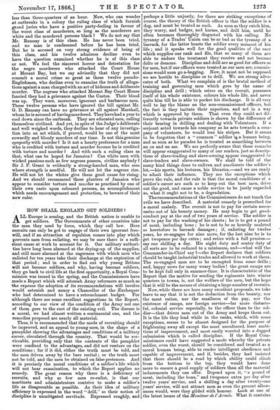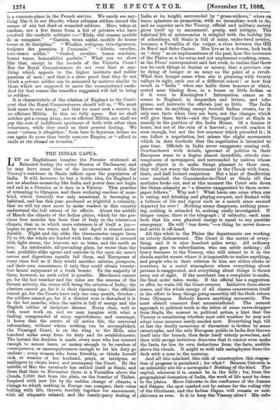HOW SHALL ENGLAND GET SOLDIERS?
LL Europe is arming, and the British nation is unable to get soldiers. The Governments of other countries take the men they need by force, which they call law. Here recruits can only be got to engage of their own ignorant free- will, and if an attraction of repulsion comes into play which prevents men from enlisting, we may be sure there is a suffi- cient cause at work to account for it. Our military authori- ties have long been alarmed at the drying-up of the supplies, and still more alarmed at the eagerness with which men who enlisted for ten years take their discharge at the expiration of that period ; and in order to find out why young Britons will not become soldiers, and why, having become soldiers, they go back to civil life at the first opportunity, a Royal Com- mission was issued in the spring, and the Commissioners have made a Report which will astonish Army reformers as much as the expense the adoption of its recommendations will involve would astonish and annoy a Chancellor of the .Exchequer who had determined to have a retrenchment budget. For although there are some excellent suggestions in the Report, according to our view of the condition of the Army not one of them goes to the root of the existing evil. The disease is a moral, we had almost written a sentimental one, and the remedies proposed are nearly all material.
Thus, it is recommended that the mode of recruiting should be improved, and an appeal to young men, in the shape of a pamphlet showing the advantages and conditions of a military career, circulated through the country. That would be ser- viceable, providing only that the contents of the pamphlet were confined to the advantages, and did not venture on the conditions ; for if it did, either the truth must be told, and the men driven away by the bare recital ; or the truth must not be told, and the men be obtained on false pretences. And it is precisely the moral conditions of a soldier's life which will not bear examination, to which the Report applies no remedy. The great reason why there is a deficiency of recruits, and why so few men re-enlist, is that our martinets and administrators contrive to make a soldier's life as disagreeable as possible. As their idea of military efficiency is expressed in the word "drill," so their notion of discipline is unmitigated servitude. Expressed roughly, and perhaps a little unjustly, for there are striking exceptions of course, the theory of the British officer is that the soldier is a dog, and must be treated as such. As soon as they catch him, they worry, and badger, and harass, and drill him, until he often becomes thoroughly disgusted with his calling. No tyranny of a Trades' Union can be so bad as the tyranny of a barrack, for the latter besets the soldier every moment of his life ; and it speaks well for the good qualities of the race which supplies our rank and file, that so many of them are able to endure the treatment they receive and not become dolts or demons. Discipline and drill are as good for officers as for men, but if our officers were treated as our men are, commis- sions would soon go a-begging. Now, it must not be supposed we are hostile to discipline or to drill. We are strong advo- cates of both. What we complain of is the brutal method of training and governing men which goes by the name of discipline and drill ; which seizes on the recruit, possesses itself of his whole existence, colours his whole life, and never quits him till he is able to pocket his discharge. It is all very well to lay the blame on the non-commissioned officers, but
the fact is they imitate their superiors, and act in a way which is approved by them. That even they could act dif-
ferently towards private soldiers is shown by the difference of their bearing in drilling and dealing with Volunteers. If a serjeant acted towards his company as he acts towards a com- pany of volunteers, he would lose his stripes. But it seems to be forgotten that a " common " soldier it a human being, and as soon as he parades he is treated as something between an ox and an ass. We are perfectly aware that these remarks will appear exaggerated to many of our readers, just as descrip- tions of slave-trading and slave-owning appear exaggerated to slave-traders and slave-owners. We shall be told of the many kind things done to enliven and ameliorate the soldier's lot,—his sports, his lectures, his libraries,—and we are ready to admit their influence. They are the exceptions which prove the rule, and the rule is that the moral conditions of a soldier's career are such as to keep out the best men, drive out the good, and cause a noble service to be justly regarded as, what it ought not to be, a degradation.
The recommendations of the Commissioners do not touch the evils we have described. A material remedy is prescribed for a moral malady. The recruit is not to pay for certain neces- sariea out of his bounty money. He may begin to get good- conduct pay at the end of two years of service. The soldier is not to pay for the washing of his sheets ; he is to get a pound of meat, including bone ; he is not to be so heavily mulcted as heretofore in barrack damages ; if, enlisting for twelve years, he re-engages for nine more, for the last nine he is to get twopence per day extra ; and retire with a full pension— say one shilling a day. His night duty and sentry duty of all sorts are to be reduced to a minimum, and—what will the Commander-in-Chief say ?—the Report declares that soldiers should be taught industrial trades and allowed to work at them. The re-engaged men are to be exempted from some drills ; and, happy news for many weary bodies the great camps are to be kept full only in summer-time. It is characteristic of the Report that the motive for sending the regiments into winter quarters in towns, is, not the welfare of the men, but the hope that it will be the means of obtaining a large number of recruits.
Now, while there are here many excellent proposals, we take leave to say that it is not the deduction from the bounty, nor the meat ration, nor the smallness of the pay, nor the existence of camps, nor foreign service—far more distaste- ful, colonial service especially, to the officer than to the sol- dier—that drives men out of the Army and keeps them out. It is the life they lead while in the ranks, which, with some exceptions, seems to be almost designed for the purpose of frightening away all except the most uncultured, least ambi- tious of improvement, and most easily worried into a dogged submission which is called discipline. If the Royal Com- missioners could have suggested a mode whereby the private soldier, even the worst, should be considered and treated as a moral human being, able to render intelligent obedience and capable of improvement, and if, besides, they had insisted that there should be a road by which ability could climb from the bottom to the top, they would have done more to ensure a good supply of soldiers than all the material inducements they can offer. Depend upon it, "a pound of meat, including the bone," and twopence extra per day after twelve years' service, and a shilling a day after twenty-one years' service, will not attract men as even the present allow- ances would, were they gilded with honour. Look at one of the latest issues of the Moniteur de l' Arme'e. What it contains is a common-place in the French service. We rarely see any- thing like it in our Gazette, wiles° columns seldom record the names of any but dead or wounded soldiers. Here, taken at random, are a few items from a list of privates who have received the medaille militaire eit6 comme modele de sa companie." " Casters, vieux soldat, modele de bonne tenue et de discipline." "Winkler, voltigeur, tres-vigoureux, toujours des premiers It l'ennemie." " Adenis, cavalier, fres-brave soldat." " Crabol, cavalier, bonne conduit, bonne tenue, honorabilite parfaite." What can we show like that, except in the records of the Victoria Cross ? But the Royal Commissioners do not even hint at any- thing which appeals to the higher instincts and nobler passions of men ; and that is a clear proof that they do not think a private soldier can be animated by motives similar to those which are supposed to move the commissioned ranks. And for that reason the remedies suggested will fail to bring us soldiers.
It is characteristic of the relation of England to the Conti- nent that the Royal Commissioners should tell us, "We must look more to our Army," and that we must seek a reserve in an efficient Militia. In this we fully agree. But we shall neither get -a strong Army, nor an efficient Militia, nor shall we pay the cost of indifferent specimens of both with other than reluctance, while they stand on their present footing. We must "reform it altogether," from base to keystone, before we can again do more than barely man our Empire, or "afford to smile at the ideamof an invasion."































 Previous page
Previous page